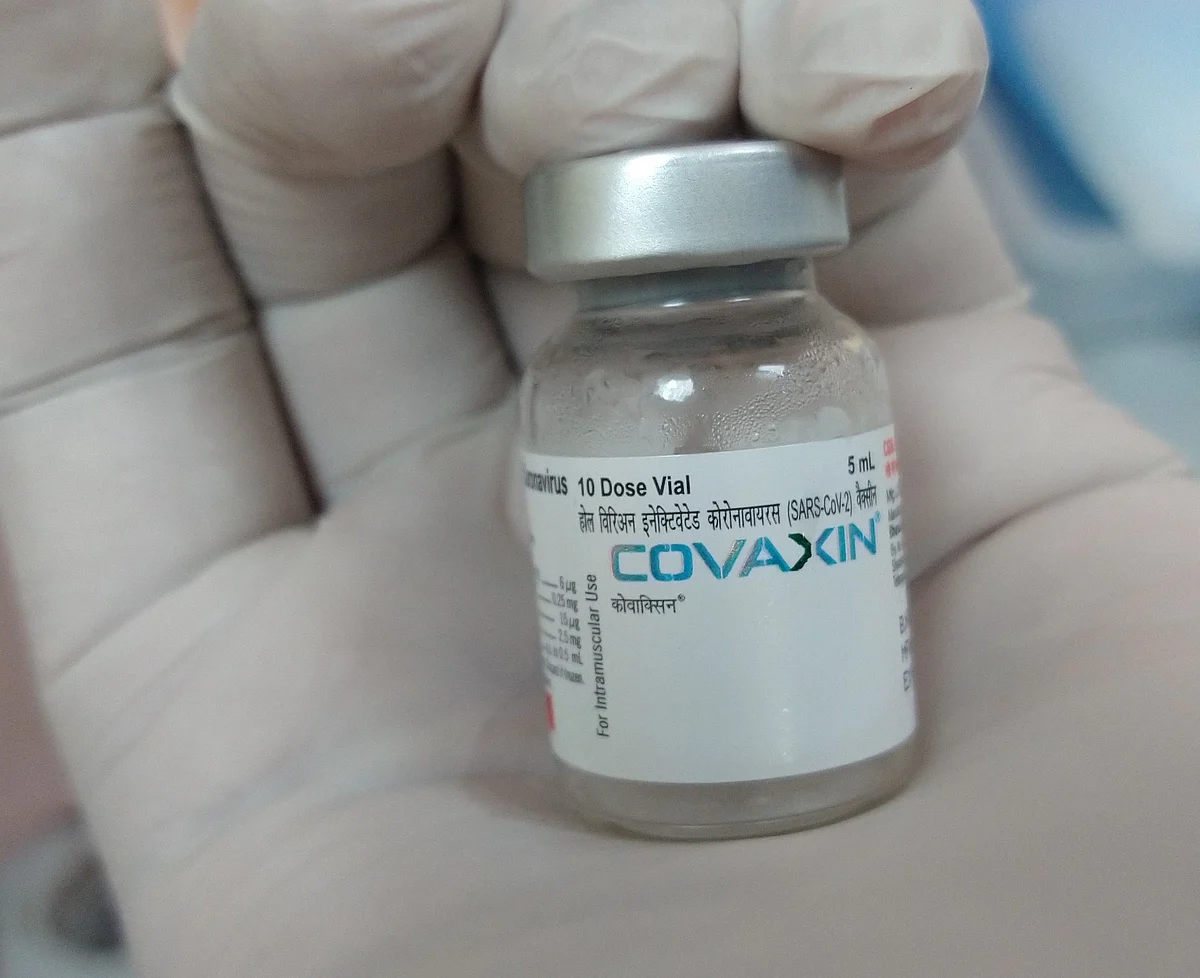A recent report by STAT has emerged about Covaxin and its maker, Bharat Biotech. The investigation suggests that the Hyderabad-based Covaxin developer, Bharat Biotech, had skipped some steps of the Central Drug Standards Control Organization (CDSCO).
According to the report, the Covixin was rushed due to 'political pressure,' and as a result, it skipped various safeguards in the process before making it available for people.
In all phases of the clinical trials for the vaccine carried out by Bharat Biotech, numerous irregularities were reportedly discovered. The research discovered a discrepancy between the number of individuals enrolled in the first and second phases of the trials and the number mentioned in the trial protocol document, which could be obtained via the corresponding papers published in The Lancet Infectious Diseases.
Ed Silverman, who conducted the report, said according to protocol documents and minutes of meetings held by an expert committee that reported to India's Central Drugs Standard Control Organization (CDSCO), the national regulator responsible for approving medicines, the protocol for Phase 3 was approved while Phase 2 was still in progress, and the final vaccine candidate was chosen without Phase 2.
What did the report find?
Jacob John, who examined the report, stated, "My issue is that the confidence of the public and medical community in the regulator takes a beating when the regulator and the expert committee seem to accept "inadequate information" to base their decisions on—or lack the clarity in their minutes to explain why this was rational." "They appear to be under duress, and this is a very worrying scenario."
Adaptive trials, which incorporate several phases and enable a trial design that may be changed as the study progresses, are one example of a protocol change that can occasionally occur. But in the case of Covaxin, a procedure should first set the parameters for any prospective alterations. which was not usually the case during the Covaxin licensing procedure, and the modifications were not supported by any scientific evidence.
One of the senior members of Bharat Biotech also confirmed the reasons behind the wrongdoing and has stated that it was due to 'political pressure' for developing the vaccine, the process was 'vetted' by the regulator, and the vaccine’s clinical trials were dictated by "speed." This is the first time that any senior officials from the company have responded to the allegations.
Krishna Mohan, a Bharat Biotech director, said, "In a classic sense of product development, we would do everything the right way—play by the book, and all the rules of the game would be followed." "But here was a situation the world didn’t foresee."
He further continued, "Please don’t think there was any issue with the veracity of the data." "Yes, it was an unusual approach, but it was dictated by the nature of the pandemic."
The vaccine had to be created at that moment since the epidemic needed to be stopped in an hour. Even WHO was eagerly anticipating the vaccine since, unlike the mRNA vaccines produced by Moderna and Pfizer/BioNTech, the covaxin didn't need to be stored at low temperatures, making it possible to use it for vaccination campaigns in low- and middle-income nations.
On the other hand, the Indian government placed a high priority on public health, which may have contributed to the reason that Bharat Biotech and the Indian Council of Medical Research, a government organisation, worked together to create vaccines.
Furthermore, the Indian government collected the 5% royalties from the vaccine sale and gave the company a manufacturing grant worth $200 million.
Dinesh Thakur, who disclosed falsified testing data and manufactured drugs of Ranbaxy Laboratories that failed to meet safety standards, said, "The government of India is in denial about the quality crisis facing the pharmaceutical industry."
Further continuing, he said, "As far as the government is concerned, it wants to see the Indian pharmaceutical industry grow, often at the expense of public health." "It will not impose or enforce any regulations that would jeopardise the growth of the industry."
The document transparency issue:
For several months, the document regarding the deal between the Indian Council on Medical Research and Bharat Biotech and even the Phase 1, Phase 2, and Phase 3 protocols was not publicly available.
The company acknowledged a serious adverse event during Phase 1 that was later determined to be unrelated to the shot.
"Protocols were not in the public domain while the trials were happening, and the trials were happening at breakneck speed with no information about the basis for granting approvals," said Aisola, who is a civil society activist who specialises in public health issues and investigated the Covaxin approval process.
Further continuing, Aisola said, "This isn’t just a purely scientific issue." It involves the role of the government and its partner, which was more than happy to cooperate because it benefited as well.
WHO stopped providing Covaxin to UN organisations in April due to violations of good manufacturing practices. Even the WHO acknowledged that Bharat Biotech had changed a few manufacturing procedures since obtaining the authorization for emergency use.
The report also agrees on an important point: the CDSCO approved Bharat Biotech to begin the phase 2 trials before the phase 1 trial data were available.
The preclinical studies, which are carried out using animals, were the foundation upon which permission was granted.
I clearly observed a mismatch in the number of enrollees while looking over the documentation. He clarified that although there had been a communication failure, this was because of the unexpected increase in work.
He said, "Perhaps we could have disclosed it." "It was not intentional." It was because of these multiple teams working together. It was not so much a discrepancy. The whole idea was, "Let’s get the data out."
"We were focused on the manufacturing part, the safety of individuals, and the ethics of handling subjects... Our focus was in a different place... This was one area that slipped our attention, and perhaps next time, one of the caveats is that we know we need to be careful.
Reshma Ramachandran, who is heading the collaboration with Regulatory Integrity and Transparency at the Yale School of Medicine, said, "The discrepancy in the number of patients in Phase 1 wasn’t huge, so the question becomes: would the change in patients have impacted results?" Probably not."
Skipping trial protocols:
In September 2020, CDSCO approved the phase 2 protocol, which was done while dropping the placebo arm. Many changes were also made to the dosing interval and the participants' ages.
For the clinical trial, which is administered to two sets of participants, one receives the active form of the vaccine and the other receives the dummy, which is also called the placebo.
After a predetermined period, investigators estimate the vaccine’s safety and efficacy by comparing the data from the two groups.
But the research states that the administrators dropped the placebo; instead, they separated the participants into two groups, one of which received Covaxin and the other received the other formulation of Covaxin.
One can skip the placebo arm when the vaccine has already been evaluated for the first time. The placebo arm allows the patient to understand and investigate the vaccine more.
The research also shares an important point, which is that the CDSCO gave the green light to Bharat Biotech to initiate the phase 2 trials even before the results of phase 1 were out.
The permission that was granted was based on the preclinical studies, which are conducted with animals.
"All of these were debated day in and day out." "Whatever we did was with the clear intention of doing it right." "There was no question of reducing sample sizes. There were not off-the-cuff or random thoughts... It was extensively debated, keeping the final objective in mind of getting a vaccine in time and not cutting any corners. Krishna Mohan, director of Bharat Biotech, said
"Phase 1 studies have a high success rate because they are usually small and only look at safety and dosage," she said. "If there were no egregious safety events during the trial, which would have halted the trial when they occurred, then one could assume the drug is safe before going to Phase 2," said Reshma Ramachandran.
The report stated, "Without the data, it is difficult to design a Phase 3 study, which is used to gauge effectiveness, ensure the testing can be extrapolated to the general population, and capture long-term side effects."
Protocol 3 puzzle:
The vaccine candidate was chosen based on the phase 1 interim study data, according to a revised version of the phase 3 protocol published in October 2020.
However, it was asserted in March 2021 that the candidate's selection was also based on Phase 2 safety and immunogenicity results.
While remaining confident in the company's decision, Krishna Mohan stated, "There was one continuum of trial results, one continuum of decision-making, and one continuum of achieving end results." As we kept building data and gaining more confidence, we seemed to be on the right track. So we didn’t wait for Phase 2. We said, "Let’s start Phase 3." "We can keep doing research, but we would be late."
"We were getting criticised for being late, and there was pressure in the country." Some of these were political, and some of these were scientific. "I think the decision to move was fairly rigorous."
This was one of the incidents that illustrates the issues with the way the Indian government oversees the creation of medical items.
(To receive our E-paper on whatsapp daily, please click here. To receive it on Telegram, please click here. We permit sharing of the paper's PDF on WhatsApp and other social media platforms.)




